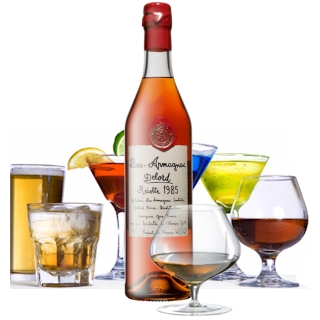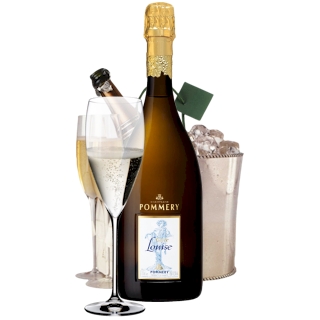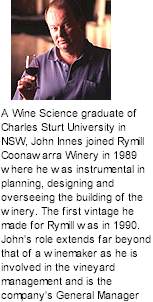


Coonawarra patriarch John Riddoch struck gold at the Ovens Valley goldfields in 1852, before establishing himself as a wholesale wine and general merchant in Geelong. He eventually settled near Penola, at shearing time in 1861. The Riddoch Run eventually expanded to 50,000ha, carrying 110,000 sheep and 3,000 cattle, and extended from Comaum in the north to Mt Gambier Airport in the south. During his subsequent four decades of community service Riddoch was Chairman of the Penola District Council for 25 years, and also the local Member of Parliament from 1865 to 1873, obtaining roads and education for the region. The Riddoch Highway and Mt Gambier's Riddoch Art Gallery currently commemorate his name.

John Riddoch's parliamentary endeavours eventually brought a railway to the South East, which revolutionised its social and economic development. He also introduced the Californian Pinus radiata to the district, thus initiating its forestry industry, and established a 20,000ha dairying enterprise at Glencoe. Most significantly, however, he subdivided his prime tract of terra rossa soil in 1890 to found the Penola Fruit Colony, which the independent and prosperous Colonists re-named Coonawarra in 1897, after the label of Riddoch's first vintage. His obituary in 1901 recognised him as The Father of the South East
John Riddoch Rymill, John Riddoch's grandson, was born at Penola Station in 1905 and studied accounting, anthropology, nutrition and surveying, and also learnt to ski and fly. In 1929, with his powerful 193cm (6'4") physique capable of carrying an 82kg (180lb) pack effortlessly, he joined a Cambridge University expedition mounted to study the interaction of the American Indians and Eskimos (Inuit) in northern Canada. Rymill next won a position as pilot and surveyor on the 1930-31 British Arctic Air Route Expedition, investigating the terrain and meteorology of Greenland beneath the proposed Great Circle air route between Britain and North America. The expedition culminated in his epic 700km crossing of the featureless 3,000m high Greenland Ice Cap with sledge and huskies.
Rymill's foremost achievement was, at the age of 29, to raise the necessary funds and lead the independent 1934-37 British Graham Land Expedition to the Antarctic. The expedition successfully surveyed over 1,000km of previously unexplored coastline, establishing that Graham Land was not an archipelago but, in fact, the Antarctic Peninsula. In 1938 John Rymill married Eleanor Francis who, having completed her Californian fieldwork at Berkeley, had just graduated as the first female PhD in Geography from Cambridge University. Arriving at Penola Station in 1939, Eleanor was soon managing the property while John served in the Navy during World War II. They then embarked upon innovative programs of perennial pasture development, and of breeding Corriedale sheep and Angus cattle. John Rymill was also keenly interested in equestrian sports, being instrumental in founding the Equestrian Federation of Australia and the Pony Club Association of SA.

Peter Riddoch Rymill, the elder son of John and Eleanor Rymill and great-grandson of the founder of Coonawarra winegrowing region John Riddoch, was born in 1940. A keen equestrian like his father, he competed in California and Ireland, retiring after he won the Australian Show Jumping Championship. He also studied Science at Adelaide University and, on his return to Old Penola Station, successfully applied genetics to establish a distinctive and lucrative composite breed of cattle. After Peter married international Three Day Eventer and Show Jumper Judy Ritchie in 1964, horses continued to play an integral role in their competitive and farming lives.
Peter and Judy diversified into viticulture in 1968 with an experimental vineyard, and six years later the family enterprise returned to Coonawarra when The Riddoch Run Vineyards were planted. While Judy managed the farm, Peter completed a degree in Wine Science and a diploma in Wine Marketing before he began building this winery in 1990. Here the vision so characteristic of his great-grandfather, John Riddoch, and his father, John Rymill, is evident. And now, with a new generation already involved, the Riddoch Rymill family tradition continues.
Rymill Coonawarra has two vineyard sites situated at the northern and southern ends of the Coonawarra region. Originally planted in 1974, the Riddoch Run Vineyards are 15 kilometres north of the Penola township and have been developed on a section of John Riddoch's original pastoral lease. Home to the winery, the 100 hectares of premium vineyards are principally planted to Cabernet Sauvignon and Shiraz.
Twenty kilometres south of the Riddoch Run Vineyards and five kilometres south of the Penola township, Three Mile Lane is located on Peter and Judy Rymill's existing landholding. The 55 hectare site was chosen for the terra rossa soil profile and has been primarily planted to Cabernet Sauvignon and Sauvignon Blanc, with smaller plantings of Merlot now coming into production.
